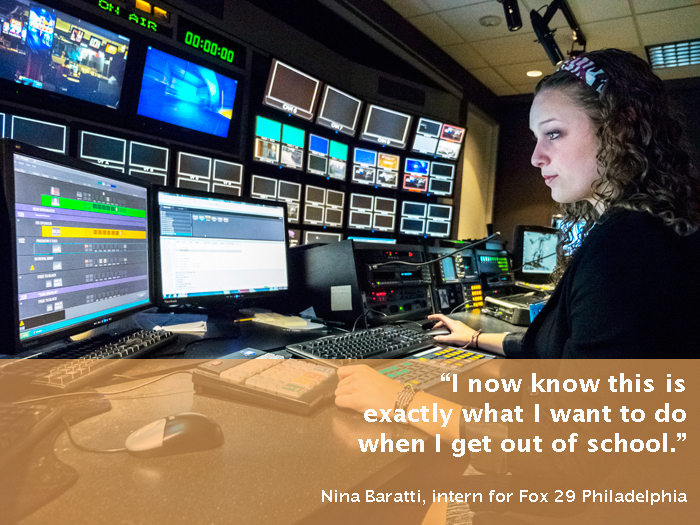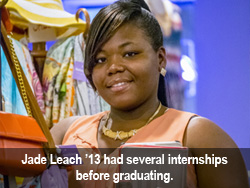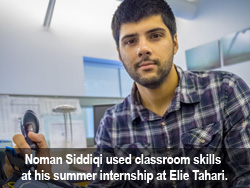The Importance of Being Interns

by Laura Griffin
In her first month on the job at Fox 29 News Philadelphia, intern Nina Baratti covered a shooting, an overturned vehicle, a lottery winner and the collapse of a vacant building under demolition.
Of all the news she chased that month, the building collapse was by far the biggest: Six people died, and a crane operator was arrested on manslaughter charges. Adrenaline pumping, Baratti covered the story alongside fellow Fox 29 reporters and the city’s other media and went to the hospital to talk to victims’ families. “It was very exciting to work on such a major story,” says the Montclair State University broadcast major.  The internship showed Baratti exactly what working in a big city newsroom is like – the challenge of getting interviews, the pressure of making deadline, the thrill of being on air. It also confirmed her choice of major.
The internship showed Baratti exactly what working in a big city newsroom is like – the challenge of getting interviews, the pressure of making deadline, the thrill of being on air. It also confirmed her choice of major.
“I love every second of it,” says Baratti, a junior. “Every day is different. I now know this is exactly what I want to do when I get out of school.”
Getting a competitive edge
With the troubled economy and increasingly tight job market of the last several years, savvy students recognize that finding jobs when they graduate is easier if they gain experience during college – whether through paid internships or cooperative education internships for academic credit.
In fact, nearly two-thirds of the nation’s class of 2013 participated in internships or cooperative education jobs for academic credit before they graduated, according to a survey by the National Association of Colleges and Employers. “That represents the highest overall participation rate since we began tracking this with the Class of 2007,” says Marilyn Mackes, executive director of the association.
“An internship really helps give them that competitive edge,” says Lauren Biondi, communications coordinator for the University’s Center for Career Services and Cooperative Education. “I often tell students that the co-op is the most important class you’re ever going to take – whether it’s where your passion lies or you decide to branch off in a different direction.”
 The sooner, the better
The sooner, the better
In keeping with the national trend, more and more Montclair State students are also landing internships. They can be found in most every workplace, from hospitals and research centers to Wall Street investment firms and major television networks to public relations agencies and social services offices.
“I tell potential employers that it just takes one,” says Gennae Hinson, director of Career Services for the College of Science and Mathematics. “If they give one of our students an internship, they’ll be amazed by their exceptional talent. Employers love Montclair State students – they’re smart, prepared and hardworking.”
Students begin seeking internships earlier in their college careers than they used to, and that’s a good thing, Hinson says. “I encourage them not to wait until they’re seniors,” says Hinson. “If they don’t need summer classes, I tell them to do something related to their future careers to get that exposure. It develops their resumes and shows progression and growth by the time they graduate.”
 Find what feels right
Find what feels right
Interning early on sometimes gives a student the insight needed to change course. “If students learn more about themselves – like perhaps it’s not the right industry for them – that’s OK, too,” Hinson says. “Sometimes self-awareness is the most important thing gained during an internship.”
Jade Leach, who graduated in May, says she learned a lot about herself during the course of several internships in college. She first worked for New Jersey Business magazine, then MTV Network’s NextMovie.com and Ebony magazine a semester before she graduated.
“I was hesitant about my internship at New Jersey Business because I didn’t think of myself as writing for a business publication,” she says. “But it was the core of everything – it’s where I broke out of my shell and found my voice.” While her other internships also helped her with her writing, it was her internship at Ebony that helped her discover that she really wants to work in fashion. It also gave her contacts in the industry that have helped her land the freelance gigs she’s had while looking for the right full-time job. “I was able to do so much during all of my internships,” she says. “I’ve been back stage at concerts, and I interviewed BET’s Terrance J. I never thought I’d be attending Fashion Week. I was able to apply what I learned in the classroom and I enjoyed the hands-on experience, even more than being in class.”
Noman Siddiqi put what he’s learned in his information technology classes to good use on the job this past summer as a tech support intern at Elie Tahari, working at both the company’s Millburn, N.J., and New York City locations.
“It’s a very hands-on experience,” the senior says. “I was able use what I’ve learned in class in the job. And there are some things I learned on the job that I didn’t get in class, so it’s great to have on-the-job experience.”
Like most interns, Siddiqi hopes the experience could lead to a job with the company eventually.
“They’ve hired several interns,” Siddiqi says. “So there’s always the chance that if you work hard and show them what you’re capable of, that there will be a job for you down the road.”
Samantha Kwiatkowski’s internship as a sexual health educator at the Women’s Health and Counseling Center of New Jersey led to a similar position after graduation in May 2012 with AmeriCorps, where she served for 10 months at a leading HIV clinic in Jacksonville, Fla. The experiences at both the internship and the AmeriCorps job, along with her experience as a graduate assistant, helped her land a job doing the same thing for the Clay County Health Department in Florida.
“I really discovered how much I love public health and sexual health education,” says Kwiatkowski, who started her new job in August. “You don’t just wake up one day and say ‘I want to talk about sex ed for a living.’ But I mostly counseled teenagers, and that was really rewarding. Having all that experience, along with my master’s degree, really gave me confidence going into job interviews.”
Experience counts
The issue of unpaid internships became part of a national discussion after lawsuits against certain employers claimed that unpaid interns were made to run errands and do the jobs no one else wanted to do for no pay.
Career Services advisors for every school and college at Montclair State make sure students are protected by understanding labor laws and their rights.
“A good rule of thumb is generally, that for-profit companies should compensate interns whereas nonprofit organizations and government agencies can offer unpaid internships for academic credit,” Hinson says. “Additionally, supervision by a professional with expertise is needed to provide guidance and feedback. Otherwise, the internship may not be legitimate.”
Students say they weigh the experience they get with the pay or lack thereof. Sometimes unpaid internships can be just the foot in the door needed to get a paid job, as it was for Drew Heimlich, now an investment banking analyst with RBC Capital Markets.
Scholarships from Montclair State’s Honors Program and from the New Jersey Society of CPAs allowed Heimlich to take an unpaid internship as an analyst at a private equity firm following his sophomore year.
“This unpaid internship resulted in my being hired with pay for the remainder of my college career,” says Heimlich, who graduated in 2012 with dual degrees in accounting and finance. The summer following his junior year, he got an internship with Ernst & Young’s New York Advisory practice that allowed him to travel for business and work with structured financial products. “I was able to leverage many of the skills I learned as I returned to the private equity firm for the remainder of college,” says Heimlich, who graduated not only with work experience but also a job offer from Ernst & Young.
Those who gain experience as interns in their fields say their internships were among the best things they did to advance their careers while in school.
“Students are not just competing with their peers here, they’re competing in a global market and they need to give themselves that edge,” Hinson says. “The internship can serve as a bridge between the academic setting and the professional world.”
